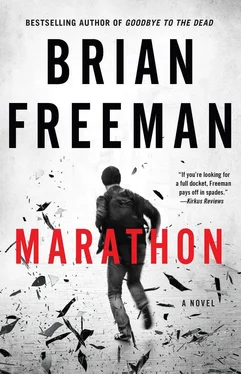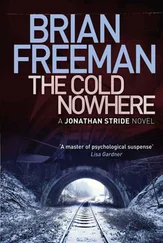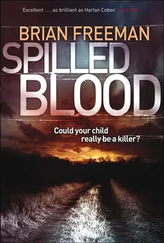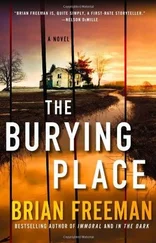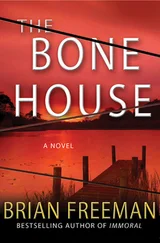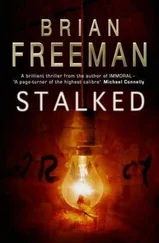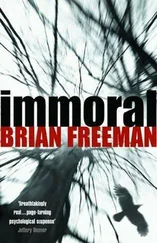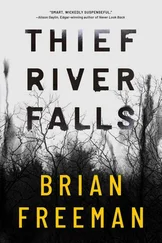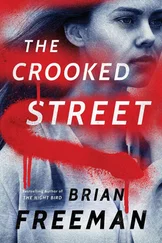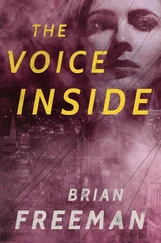“I want to caution everyone not to jump to conclusions,” the FBI agent, Patrick Maloney, warned the public.
Don’t jump to conclusions .
Jonathan Stride should have thought about that before he nearly destroyed Michael’s life in a single night. Later, when the real killer was dead, the lieutenant had apologized. The sergeant, Maggie Bei, had apologized, too, but it didn’t matter. The damage to his life and his marriage was already done.
A serial killer targeting redheaded women who looked like Alison? Michael must be guilty.
A pressure-cooker bomb at a marathon? Don’t jump to conclusions.
Michael had heard the same song before, over and over, around the world. San Bernardino. Paris. Brussels. Fort Hood. London. Sydney. Don’t jump to conclusions. And in the end, it was always the same. Islamic names. Islamic faces. People got tired of being told to believe everything except their own eyes.
He thought again: I was there. I saw him.
“Twitter?” Alison asked.
Michael looked up from his phone. “What?”
“I always know when you’re looking at Twitter. Your face gets so angry.”
“Come on, Alison.”
“You should look at yourself in a mirror sometime. See what I mean. That’s why I prefer Facebook. On Facebook, it’s mostly about the cat videos, you know? But you and Twitter — I don’t like it, Michael. I really don’t.”
“Okay, yes, I’m angry. This guy killed people. I was there. You expect me to be smiling about it?”
“That’s not what I mean,” Alison said.
“Then what do you mean?”
His wife reached for his hand. “When I heard about the bombing, the only thing I wanted to do was hold on to you and Evan. We are blessed to be alive at all. Didn’t what happened two years ago prove that to you? I needed you with me today, Michael, and you didn’t come home. Where were you?”
“I’m sorry. I just couldn’t leave.”
“Why not? Everyone else did.”
“I know that, but you weren’t there. I saw—”
His wife interrupted him. “I know. You told me. You saw someone with a backpack. It’s fuzzy, and you can’t really remember the person’s face. Hundreds of other people who were at the marathon are probably saying exactly the same thing right now. It’s okay, Michael. You told that police officer about it. You did the right thing. Now you have to let it go.”
“How can I let it go? His face is in my head somewhere. Maybe they could hypnotize me or something, and I could remember. It drives me crazy to have them stand up and say they don’t know what this is, when I know what I saw. A Muslim guy with a backpack heading toward Canal Park. And fifteen minutes later — boom.”
“The fact that he was there doesn’t mean he did it,” Alison pointed out.
“Okay, sure, maybe not, but what if he did? He bumped into me on the street, Alison. The bomb could have gone off right there. I’d be dead. Evan would be dead, too.”
Her eyes welled with tears. “Don’t talk like that. Don’t even say that.”
“I’m sorry, but I just want you to understand why this is so hard for me. You haven’t been to the rallies when Dawn was speaking and seen the faces of the protesters. The hatred in their eyes? It’s unbelievable. That’s what I saw in the guy who passed me. That’s what I remember. Hatred. He heard me talking about No Exceptions, and he deliberately slammed into me. I know that’s what happened.”
His wife sighed and closed her eyes. “I just wish—”
“What?”
Alison shook her head. “Nothing.”
“Tell me,” he insisted.
“I just wish you hadn’t gotten so caught up in Dawn Basch and this whole No Exceptions crowd. They make me uncomfortable.”
He sat up in his chair. “What are you saying? This is her fault?”
“No, of course not.”
“Dawn is defending free speech and the Constitution. Nobody else is standing up for the First Amendment. They’re all too politically correct to say anything. For God’s sake, these people riot and murder over cartoons , Alison.”
Alison sat up, too, and put a hand on his knee. “All I’m saying is that the whole city got a lot angrier after Dawn Basch came to town. You got a lot angrier. I don’t think that’s a good thing.”
“Some things are worth getting angry about,” Michael snapped.
He got up and walked away, leaving Alison on the porch. She called after him, but he slammed the door. A feeling of uselessness washed over him. Throughout his life, he’d needed a cause, but his business was gone, and he’d found nothing to fill the void.
Michael climbed the stairs to the master bedroom, but he wasn’t ready to sleep. He took the twisting iron staircase up to the half floor at the top of the house, where he kept his man cave. The small space was paneled in dark wood under a low, angled roof. Wet bar. Framed Vikings posters. High school and college swimming trophies. A television the size of Wyoming. His desk and computer.
He booted up his Mac, and he scrolled through his Twitter feed again. Yes, the people out there were angry, but they spoke his language. They didn’t need the police and the government to tell them what had happened at the marathon. They already knew.
He could see the reflection of his face in the monitor. Alison was right; his expression looked chiseled in stone.
Michael tapped on his keyboard and tweeted under his handle @malvileo:
I was there. Think I saw the guy. What’s the site where everyone is posting marathon photos?
Ten seconds later, a user named @danmink59 replied.
diggitt.com. Go get him, man. #noexceptions
Michael found the website, where a link to the cache of uploaded photos was in a banner on the home page. A counter kept track of the users accessing the site. Thousands of online detectives were already examining photos, all of them showing places he knew intimately, taken along every mile of the marathon route.
He went to the wet bar and made coffee. He needed caffeine for the long night ahead of him. He clicked on the first photo and zoomed in on the faces, and he studied them one by one.
He was looking for a man with a backpack.
A terrorist.
Where are you?
Stride waited in the parkland by the olive-colored waters of Chester Creek, near the bridge at Skyline Parkway. At dusk, the area was empty and silent, except for whispers in the dense trees. The cool wind rustled his wavy hair. By instinct, he reached for a pack of cigarettes in his pocket, but he’d quit long ago. The craving came back at moments like this, when he was alone after a long, difficult day. His middle and index fingers rubbed together, as if a Lucky Strike were still between them.
He checked the time on his phone. Haq was late.
They usually met here, down the hill from the dormitories of UMD, where Haq Al-Masri was a professor of religion and the faculty advisor to the Muslim Student Center. Haq didn’t like to be seen with Stride; he couldn’t afford to be perceived as a spy in his community. It had taken Stride three years to win the man’s confidence, but trust was a fragile thing, particularly in the current climate. They both knew they served different masters. Haq was a Muslim first, and Stride was a cop first.
As he waited, he texted Serena. Is Cat okay?
His wife texted back almost immediately. She’s struggling.
Stride frowned. Serena had told him about Cat and the stolen beret, a stupid act of rebellion that had saved the girl’s life. It took his breath away, to know how close she’d been to the bomb, to know how easily it could have gone another way.
Does she remember anything?
Читать дальше
